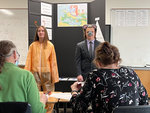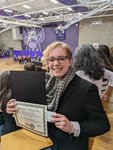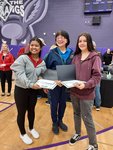


Students from Chief Umtuch and Pleasant Valley middle schools won first place in multiple categories during the Washington History Day contest in late April, securing their spots in the national competition.
Chief Umtuch eighth grader Aubrey Grier took first place in the individual documentary junior division for her short film “Makah Whaling Rights: A Moral Debate of Cultural Preservation” while Pleasant Valley eighth graders Lauren McCombs and Sam Watts won first place for their junior division group performance “The Origins, Transmissions, and Impact on History of the Black Death Debate.” Andrea Uribe and Jordyn Mongnath Fair from Pleasant Valley also won the junior division special award of $150 for their project, “The Treaty of Nanjing 1942: A Success for Britain, a Failure for China.”
Irene “Rene” Soohoo, a U.S. history and English language arts teacher at Pleasant Valley, said it was gratifying to see her students do well at the competition.
“From year to year, it’s kind of like the Kentucky Derby where you don’t know what the competition is,” Soohoo said. “When you teach them the rubric of research and analysis and to have them put it all together and win is very exciting.”
McCombs and Watts will be the 37th and 38th kids from Pleasant Valley to head to the National History Day finals, which takes place next month.
Soohoo said the students’ project was difficult because she wasn’t sure how their topic of the Black Death would fit into the competition’s theme of debate and diplomacy. The students were able to pull off the win because they honed in on people’s response to the plague and how they handled it. They used people’s response to the COVID-19 pandemic as inspiration.
During the presentation, McCombs dressed as a flea while Watts dressed up as a rat to represent the animals that were potential causes of the plague, a debate that Soohoo said is still prevalent today.
“Just because you cannot match the symptoms from both time periods does not mean the medieval disease was not a plague,” said McCombs. “Historians used the tool of science, x-rays, carbon dating, and DNA testing and let the data lead them to test new hypotheses.”
Grier’s teacher Beth Doughty, who teaches ASPIRE English language arts and history, is proud of her student’s accomplishment as well.
“I’m glad that she was recognized for the quality of her work, but I’m not surprised at all. I’m super proud of her,” said Doughty. “Aubrey addresses every task with her best effort. She is exceptionally talented and one of the most mature students I’ve ever had. She produces adult-quality work and it was all her.”
Grier’s project was focused on the Makah Native American Tribe and their whaling activities in the 1990s. She was inspired to take on the project because her grandfather works for the Lower Columbia Fish Recovery Board and frequently works with tribes.
“That topic came up in a conversation and I was reading some news articles about it. For something that hasn’t come back up since the ‘90s, I thought it would be interesting to pursue it as a school project,” Grier said.
Her project covered how whaling was part of the tribe’s culture. As the tribe hunted whales in 1999, they received death threats.
She said it took her several months to complete the 10-minute YouTube video, which features clips from a documentary on the tribe and other research she found.
“I’m just really excited, relieved, and grateful for the opportunity to compete in the National (History Day) competition because it was not something I was expecting at all,” she said. “I was not prepared (to win), but I think the stress and work really paid off.”
Besides first place in her category, Grier also won the Laura B. Gowen Award for the entry and a $100 prize sponsored by the National Society of Colonial Dames.
The National History Day finals will be held virtually from June 12 to June 16. The competition will feature 3,000 students from all 50 states, as well as international students in China, Korea and South Asia.